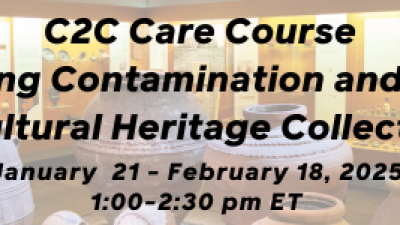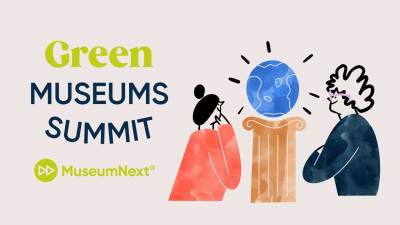
I was very disappointed to miss the “rogue session” at the AAM meeting in Atlanta dedicated to museum labor practices. It is, as readers of this blog know, an issue of intense interest to me, and to our field. Fortunately, two of the organizers of that of-the-moment event sent the following report—Nina, Alyssa, thanks for sharing. I’ll be following Museum Workers Speak on Facebook and Twitter, and look forward to participating in future events.
*******
“I have a Master’s degree but am earning intern money. That ain’t gonna work.”
“I fought tooth and nail with my boss to get an intern a measly $1000 stipend.”
Skip over related stories to continue reading article“I’m tired of being expected to accept that I make less than $40,000 a year in a major city.”
“These labor issues disproportionately affect people of color.”
“I am tired of being the only black person I know in museum leadership.”
“It gives me hope to hear the white people in the room talk about their own privilege.”
On the evening of April 28th, over 70 museum professionals and graduate students packed into a small art gallery in Atlanta, Georgia. Hailing from a plethora of institutions, origins, positions, and backgrounds, the group was united by a desire to speak about and improve museum labor practices. A “rogue session” adjacent to the American Alliance of Museums Annual Conference, this was the first public convening organized by Museum Workers Speak, a collective of museum activists dedicated to creating a more equitable future for cultural workers and museum professionals. We — Alyssa Greenberg and Nina Pelaez — are two of the group’s founding members. In this blog post, we’ll share some of our reflections on the rogue session and their implications for the future of museums.
The core members of Museum Workers Speak found one another through informal peer networks, the #MuseumsRespondToFerguson tweet chat, and participatory conference sessions. We are passionate, engaged museum professionals who are diverse in terms of our personal identities, educational experiences, the kinds of work we do, and the kinds of institutions in which we work. What we share is being vocal about our experiences as museum workers. We make ourselves vulnerable by speaking out: in the museum field, silence about labor and working conditions is deeply entrenched, and breaking it can damage our professional reputations and even endanger our jobs. But taking this risk has also been rewarding; by having our own experiences be heard and understood by one another, we connected. We came to see that our experiences were not isolated instances but shared narratives that reflect broader, systemic inequalities. Our intention became to cultivate spaces for this kind of sharing and connection — both in-person and digital — that could develop from conversation to action.
For Elaine Heumann Gurian, the museum as a civic forum can be “a fitting safe place for the discussion of unsafe ideas.” The rogue session was a response to one such unsafe idea: the taboo around museum labor and its effect on the museum’s capacity to act as an agent of social change. While the 2015 AAM conference theme “The Social Value of Museums: Inspiring Change” reflected the field’s increased commitment to addressing social inequality and initiating civic dialogue, we were troubled by a disconnect between this growing interest in advancing social change and the silence surrounding museums’ internal practices including hiring, leadership, and working environment.
Our desire to facilitate dialogue that generates a concrete blueprint for action was at the core of the session’s curriculum. Inspired by Paulo Freire’s critical pedagogy, we felt it was important for all participants to share their experiences as a means of envisioning our collective capacity to enact change.[1] Although this took time, the exercise made visible the inextricable link between museum labor and social inequality. Drawing from the narratives shared by participants, we then developed a series of topics for breakout groups, which included salary and wage disparity, diversity and tokenism, unpaid and low-wage work, and leadership and career mobility. These discussions centered on visions for change and action steps, a snapshot of which is visible on the rogue session Storify summary.
The ensuing dialogues revealed the intersectionality of this issue: a discussion about museum labor practices is inevitably a discussion about racism, sexism, misogyny, elitism, and various other social inequalities. We found that by speaking openly about labor, we opened the door to frank conversations about race and privilege that might not otherwise have gotten off the ground.
What also emerged was recognition of the complexity of this issue. One attendee’s remark that “at the point of hiring, we are too late” made visible the many layers of infrastructure and the many voices, largely absent from the rogue session, that impact this issue. Of a group of over 70 attendees, only one worked in Human Resources; only two were museum directors. We understand that change cannot and will not happen unless staff working at all levels and in all museum departments, as well those from other related institutions, including graduate program faculty, funders, professional organizations, and cultural leaders, expand their consciousness of how their choices impact museum working conditions.
 |
| Photo by Miriam Bader |
If we truly believe in the power of cultural institutions to shape our communities and transform our world, then we must also believe that our internal practices have an impact, and must act according to the changes we seek. Looking ahead, we hope that Museum Workers Speak will elicit widespread recognition of what isn’t working and inspire systemic change so that museums can fulfill their highest potential as protectors and promoters of the public good. To enact our vision, Museum Workers Speak will facilitate digital and in-person public gatherings that will collectively cultivate action steps: @MuseumWorkers will host monthly tweet chats on the first Wednesday of every month beginning June 3rd, and a series of regional Museum Workers Speak conversations are already underway (the first took place in Washington D.C. in May, and two more are scheduled for this summer in Washington D.C. and Chicago.) Please reach out to us at MuseumWorkersSpeak@gmail.com to stay in touch or to collaborate with us.
References:
[1] Elaine Heumann Gurian, “A Savings Bank for the Soul: About Institutions of Memory and Congregant Spaces, 1996,” in Civilizing the Museum: The Collected Writings of Elaine Heumann Gurian (Taylor & Francis US, 2006), 93.
[1] Ira Shor, “Paulo Freire’s Critical Pedagogy,” in Paulo Freire: A Critical Encounter, ed. Peter Leonard and Peter McLaren (Routledge, 2002), 24–35.









Dear Future of Museums,
Does AAM have a written policy of the association's representation of "museum workers"?
Thank you !
-Mark Walhimer
Thanks for your question, Mark! I'm not quite sure what you mean, so I will follow up with you to find out more.
It seems to me that the real question is: can the AAM represent both member institutions and employees/volunteers of member institutions? Is this even possible? For example, has AAM ever supported museum workers in disputes with museums over working conditions? Does the AAM ever address museums that fail to "protect" their human resources [e.g. from unrealistic expectations given resources available] as they are obligated to do by the AAM Code of Ethics p. 2 in the same sentence that lists collections?
NOTE: your system allows you to preview, but it does not allow return to make connections. Attempts to do so result in a blank field & the previous preview page is expired.
Unpaid internships are a real issue in museums and key to transforming the workforce
https://www.museumnext.com/2017/06/the-cost-of-internships/
These days, all I hear/read about these issues is silence. I suggest individuals who remain concerned & who plan to attend upcoming national and/or regional museum association annual general meetings consider introducing resolutions requesting action like the following:
DRAFT Resolution for Professional Museum Organisation Annual General Meetings:
WHEREAS: museum institutions have an ethical duty to “protect” employees [and volunteers too] on the same level of importance as collections (International Council of Museums 2004: 1; American Association of Museums 2000: 2),
WHEREAS: retention of emerging and mid-career museum professionals in this field anecdotally is problematic due to unsustainably low pay levels compounded by unreasonable expectations to overwork (Milldrum 2017; Merritt 2015),
AND WHEREAS: an informal survey of 1,067 museum workers has found evidence that, of those respondents who no longer work in the field, 65% reported low pay and 33% reported poor work/life balance among multiple reasons for leaving their museum jobs (Ocello et al. 2017: 6; Erdman et al. 2017),
THEREFORE, BE IT RESOLVED THAT:
This annual general meeting of [INSERT NAME OF ORGANISATION HERE] direct the Executive to investigate, partner with like regional, national, and international professional museum organisations to plan and carry out formal research on museum workers at all levels and, based on the results of such research, then plan and take best effort actions to address any substantive pay (e.g. Nonprofit Quarterly 2014) and quality of working life issues identified by the research to ensure that the problems identified are addressed effectively at the earliest possible dates.
References Cited:
American Association of Museums. 2000. Code of Ethics for Museums. Washington: American Association of Museums.
Erdman, Sarah et al. 2017. “Leaving the Museum Field.” Alliance Labs blog [American Alliance of Museums] posted 22 September http://labs.aam-us.org/blog/leaving-the-museum-field/ .
International Council of Museums. 2004. ICOM Code of Ethics for Museums. Paris: International Council of Museums.
Merritt, Elizabeth. 2015. “Unsafe Ideas: Building Museum Worker Solidarity for Social Justice.” Center for the Future of Museums Blog posted 2 June at http://futureofmuseums.blogspot.ca/2015/06/unsafe-ideas-building-museum-worker.html .
Milldrum, Claire. 2017. “Why I Left The Museum Field: A Guest Post By Claire Milldrum.” ExhibiTricks: A Museum/Exhibit/Design Blog posted 11 September http://blog.orselli.net/2017/09/why-i-left-museum-field-guest-post-by.html .
Nonprofit Quarterly. 2014. [Pay deficits in the case of women in museum work for example are well-documented. Nonprofit Quarterly March 2014 reporting on National Center for Arts Research found that women leading art museums “earn 79 [to 71 for small museums] cents on the dollar paid to male peers,” The GuideStar 2013 Nonprofit Compensation Report finds similar differential between pay for men compared to women across all categories. 2012 American Association of Museums study reports women make 78%.]
Ocello, Claudia et al. 2017. “Why are Great Museum Workers Leaving the Field? Survey by Claudia Ocello, Dawn Salerno, Sarah Erdman, & Marieke Van Damme.” https://docs.google.com/presentation/d/1_aHdxmG0Jdb4deqsjyhH9eoDUIPXz_EdkU-7gWuXDwE/edit?usp=sharing .
Thank you for your latest comment, Paul. Please note that this guest post was written by Alyssa Greenberg and Nina Pelaez, two of the founding members of the group Museum Workers Speak.